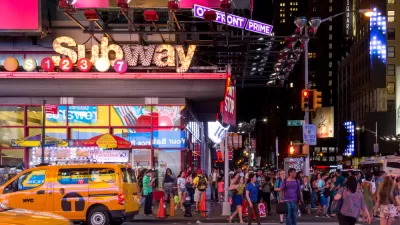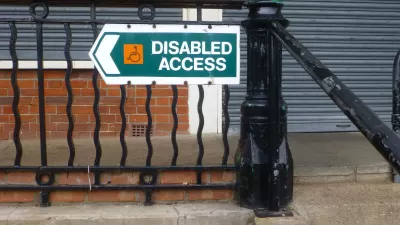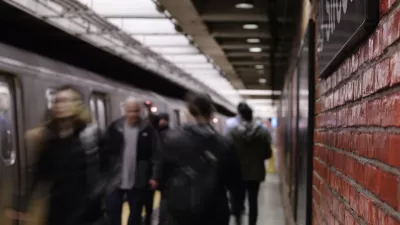It's been remarked upon before. Infrastructure in New York City is a cost nightmare compared to other global cities. Accountability is lacking, Josh Barro writes, but MTA also suffers from an "institutional lack of power."

Amid the nationwide debate over crumbling infrastructure, Josh Barro writes, "where New York stands out is the massive price tags associated with proposed and actual new projects, and the delays and limitations of vision they impose on new construction." While cities like London and Paris implement "transformative" transportation projects, NYC is paying inflated sums for the "mundane."
Barro goes through some of the many problems driving up costs. It's a lengthy paragraph. "When you're doing everything wrong, the best way to fix the problem isn't usually to go through the list of things you're doing wrong and fix them one by one. It's best to step back and ask why you're so bad at everything, whether a systemic problem is causing you to make so many separate mistakes."
Two root problems afflict MTA, Barro says. The first is a lack of accountability: it's unclear who's in charge, and no one is on hand to take blame. "Less discussed than the accountability problem is the MTA's institutional lack of power. When the MTA wants to build a big new shiny thing, it's at the mercy of a lot of people and entities it doesn't control."
Tackling the accountability problem will require fixing the power problem, Barro writes. The agency must have "the tools it needs to have even a chance at success, so somebody will be willing to be blamed if it fails." And beyond dealing with MTA's dysfunction, another question New York should be asking is, "At what point is the price too high for a project like this to be worth building?"
FULL STORY: Why New York Can’t Have Nice Things

Alabama: Trump Terminates Settlements for Black Communities Harmed By Raw Sewage
Trump deemed the landmark civil rights agreement “illegal DEI and environmental justice policy.”

Planetizen Federal Action Tracker
A weekly monitor of how Trump’s orders and actions are impacting planners and planning in America.

Why Should We Subsidize Public Transportation?
Many public transit agencies face financial stress due to rising costs, declining fare revenue, and declining subsidies. Transit advocates must provide a strong business case for increasing public transit funding.

Understanding Road Diets
An explainer from Momentum highlights the advantages of reducing vehicle lanes in favor of more bike, transit, and pedestrian infrastructure.

New California Law Regulates Warehouse Pollution
A new law tightens building and emissions regulations for large distribution warehouses to mitigate air pollution and traffic in surrounding communities.

Phoenix Announces Opening Date for Light Rail Extension
The South Central extension will connect South Phoenix to downtown and other major hubs starting on June 7.
Urban Design for Planners 1: Software Tools
This six-course series explores essential urban design concepts using open source software and equips planners with the tools they need to participate fully in the urban design process.
Planning for Universal Design
Learn the tools for implementing Universal Design in planning regulations.
Caltrans
Smith Gee Studio
Institute for Housing and Urban Development Studies (IHS)
City of Grandview
Harvard GSD Executive Education
Toledo-Lucas County Plan Commissions
Salt Lake City
NYU Wagner Graduate School of Public Service





























